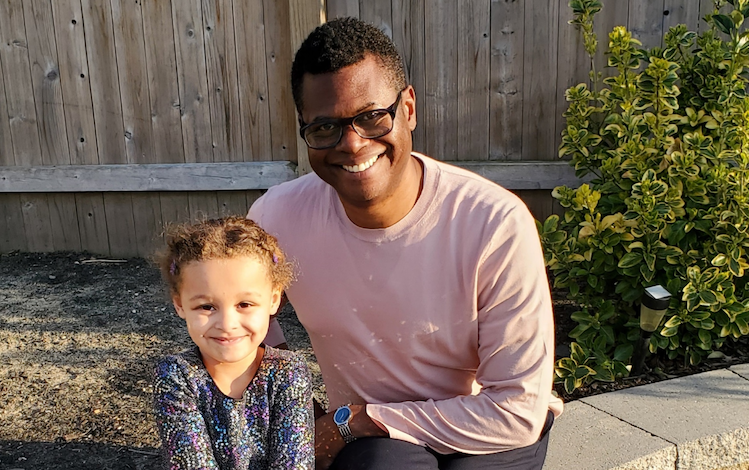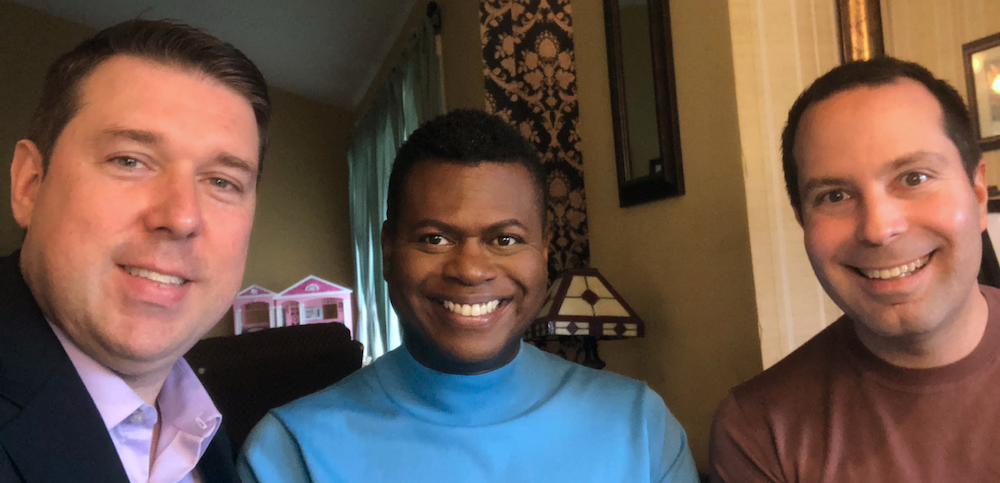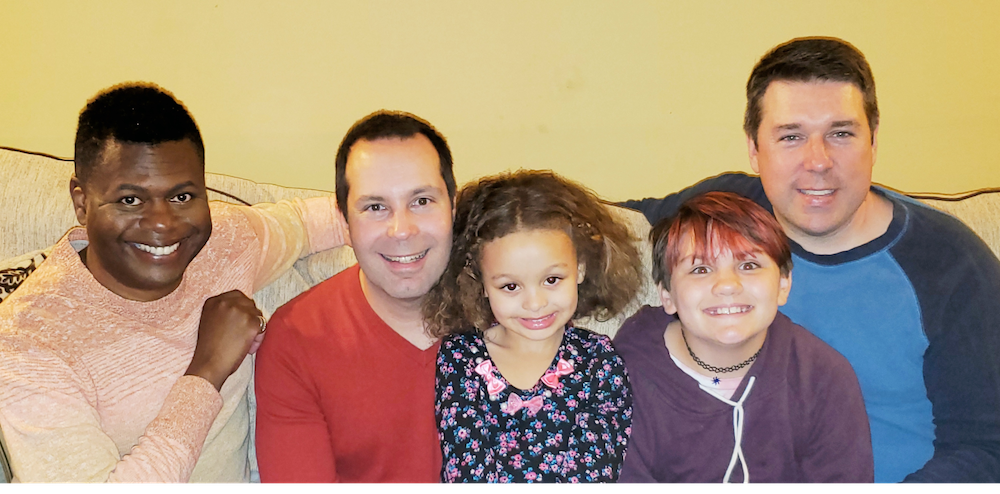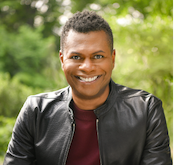

Pride 2021: What Chosen Family Means to Me
(Photographs courtesy of H. Michael Morse)
When the pandemic turned the world upside down, I was sharing an apartment with three roommates I barely knew in New York City, confined to a tiny bedroom to live, work — and try to relax. Personal space (and social distancing) became a matter of survival and finding it in one of the world’s most bustling, populated cities added a great deal of stress during a time already fraught with anxiety. One afternoon I received a phone call from two of my most thoughtful, longtime friends. Married partners Jason and Jimmy had a surprising offer: Take a respite from the city and come live with them and their two kids in the suburbs of Southern New Jersey. A COVID-19 bubble with people I love, plus SPACE including a front and backyard was more than tempting. Given the chance to be with my tribe — I immediately said “yes.” But like many self-reliant urban professionals I had a few concerns. How will I fit in with the rhythm and vibe of a young family when I’m so used to being independent?
Family is an expansive concept
My new situation came with two very big (small actually) unexpected perks: Audrey, 4, and Paige, 10, Jason and Jimmy’s children. Both of these incredible kids viewed the world with wonder and opened my eyes to experiencing everyday moments in new ways, helping me find energy and happiness during a trying time.
There was another dimension of connection. Audrey is biracial — which led Jimmy and Jason, being fantastic parents, to embrace the opportunity for me and Audrey to connect over our shared identity. As a Black man working in communications familiar with being the only Black person in many rooms, I welcomed the chance.

?Adopting a new perspective
While living with my chosen family in the suburbs, I began interviewing at WE Communications (WE), thanks to a tip from one of my mentors who is a member of the LAGRANT Foundation.
The interview process at WE was comprehensive and lasted several months, during which I had the opportunity to meet many people from all over the company. I heard consistently how important DEI is to the agency, a perspective that came through from everyone with whom I spoke — and it didn’t feel like lip service or checking boxes. As a gay man who is Black, I bring a lot of diversity to the table, so I get it.
Everyone I met with at WE let me know it was ultimately my gift for communications and expertise that was most important reason for offering me a seat at the table. By the time I said yes, I believed WE wanted to enrich the agency with more people of color not only because it’s the right thing to do, but it makes the work — and work community — better for everyone.
Why we need to be fully seen
For me the critical factor for joining WE was that it was clear the agency wanted my perspective AND they wanted my talent. I’ll admit that this “culture of belonging” they talked about during the interview process surprised me at first. It wasn’t something I had really thought about. And I wasn’t sure it even existed. Being LGBTQ and BIPOC, I know well the lack of diversity in communications, so I have always depended on my expertise to speak best for what I have to offer. But I can’t overemphasize the importance of this: They wanted all of me.
How did I personally experience the WE culture of belonging? When my manager, Jamie Jang, checked in with me the day Derek Chauvin’s verdicts were announced, to let me know it was okay to take time away from work, if necessary, to process the day’s events. When Global CEO and Founder Melissa Waggener Zorkin announced generous 8 for You opportunities (extra paid days off to take at your discretion) to recharge during a stressful year. When President of North America and Chief Client Officer Dawn Beauparlant hosted virtual new hires gatherings on Teams so people who have never stepped foot in a WE office can feel better connected to the agency. ACTIONS make purpose real. Work communities can also be a chosen family when you’re truly seen, heard and respected.

A great deal of my success to date is in making connections. It’s a natural extension of who I am, and I do it whether I’m paid to or not because it’s in my DNA. Getting to know people and their needs is what I do for work and how I live my life. When I know WHO you are, I immediately think: How can I support you? It can be a dentist referral or a vendor who needs a commercial music producer. It’s how I connect clients to influencers, TV hosts, and the people and talent who will move the needle of their business. This comes down to three things: thoughtfulness, empathy and generosity — you must be thoughtful to think about someone else for five minutes, empathetic to put yourself in someone’s shoes, and generous to lend your contacts even if there isn’t something in it for you per se. It’s how my pandemic pod story about chosen family ended up on the Tamron Hall show. I had met a talent booker years ago while working to get media traction for a client, and we developed a friendship. When she saw my posts featuring the adorable children I now counted as part of my extended family, she reached out and asked, “Tell me more.” And this kind of magic can only happen when we can be our full selves at work. For me it means being straightforward, exhibiting kindness, compassion — what was once known as “soft skills” are integral for me to operate at maximum capacity. That is the business case of a culture of belonging: When I bring 100% of myself to work, I bring 100% to my clients and co-workers. Organizations that embrace DEI efforts are smart businesses.
Pride redux: what it means to truly belong
As Pride month arrives for the second year without some of the usual fanfare and parties, we still celebrate diversity. Belonging is a not just a feel-good concept — it’s a powerful motivator that harnesses the unlimited potential in people.
I won’t be celebrating Pride in the city this year with brunch parties and people watching. But I get to be the fun uncle on the block for Paige, Audrey and their pals, aka “the street peeps.” They all know me, and I’m part of their lives. Although this is a different social circle than I’m used to running in, I wouldn’t trade it for anything in the world. My chosen family is an unexpected gift of the pandemic, and it continues to be as instructive to me as it is to the kids and their parents. I packed up my things to bubble up with them, thinking I would need to learn about them and vice versa, but the gift is how much I learned about myself. Being seen is powerful: It’s how we connect with one another, at home, at work and in all our chosen families. Is there anything more important for a communicator today?
 H. Michael Morse is a tenacious, savvy, and accomplished public relations (PR) executive, who connects the dots to provide media relations, special events, DEI marketing, and social media services to meet and exceed clients’ integrated marketing goals. Currently serving as Account Director, Consumer, at WE Communications leading the Microsoft Store business, he is passionate about PR and its ability to shape and shift public opinion and move businesses forward. (Photograph by Andrew Werner)
H. Michael Morse is a tenacious, savvy, and accomplished public relations (PR) executive, who connects the dots to provide media relations, special events, DEI marketing, and social media services to meet and exceed clients’ integrated marketing goals. Currently serving as Account Director, Consumer, at WE Communications leading the Microsoft Store business, he is passionate about PR and its ability to shape and shift public opinion and move businesses forward. (Photograph by Andrew Werner)
The latest blogs from WE
Decoding Gen Alpha: A Primer on the Next Gen of Consumers
Why Gen Alpha Will Fuel Spending This Season
Why Reputation Is a Business Driver in Healthcare

